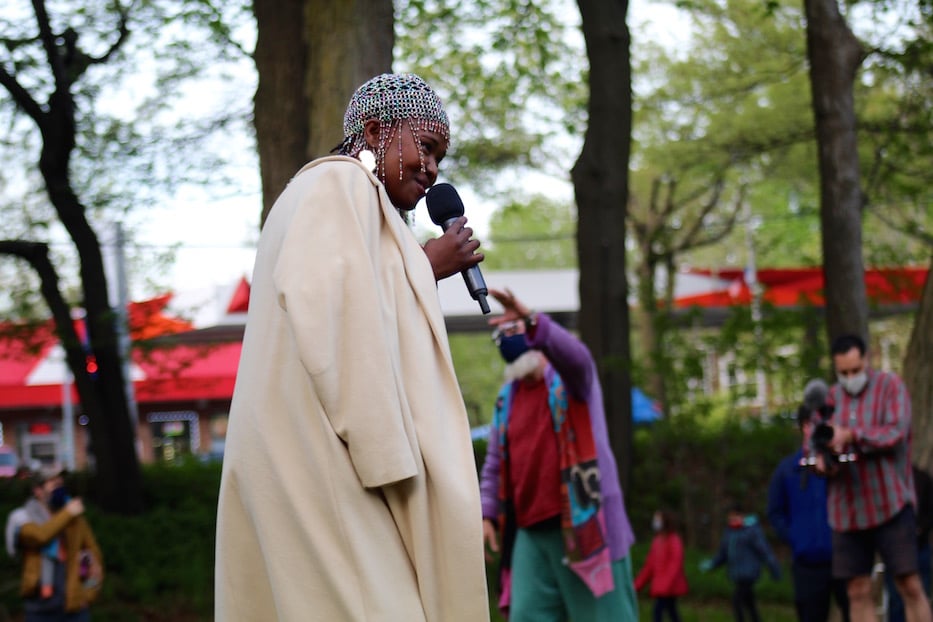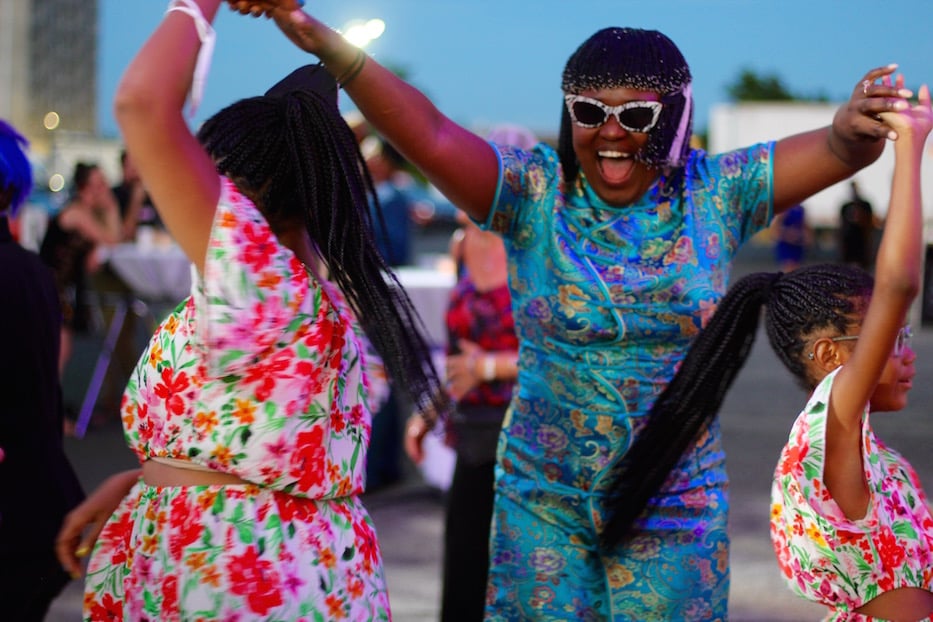
Thabisa at Westville's 2021 Artwalk. Lucy Gellman File Photo.
One of the city’s most prominent artists and cultural champions has been tapped to oversee New Haven’s allocation of federal relief funding in the arts. Her first priority: to listen to her neighbors. All 135,000 of them.
That person is Thabisa Rich, who Monday was hired as the new community outreach coordinator for New Haven city government’s Department of Arts, Culture & Tourism. Working on a three-year, full-time contract, Rich will serve as the primary liaison between the City of New Haven, cultural collaborators, and artists and arts administrators who are beneficiaries of American Rescue Plan Act (ARPA) funding.
Her new three-year job is funded entirely by ARPA dollars, of which the department received a $1.2 million chunk from the city last year. Through 2026, she will join Cultural Affairs Director Adriane Jefferson and Outreach Coordinator Kim Futrell in the department. It is not her first time working with the city: Rich was the community coordinator on the city’s Cultural Equity Plan last year.
“For me, it felt like a natural fit,” Rich told the Arts Paper as she buzzed between meetings on her first day on the job. “I was drawn to it because I love working with the community and I love working with the arts. I felt like this was a perfect combination—to identify the needs of the community. I thought I would be kidding myself if I didn’t throw my name in.”
“I feel excited because I believe that what she brings to the table is the ability to be a bridge builder,” said Cultural Affairs Director Adriane Jefferson, noting Rich’s own experience as an artist, an immigrant, a Black woman, and an administrator. “Thabisa’s role is key. It will give us capacity to begin to sustain the cultural equity work that we have started.”
In her position, Rich will be juggling multiple projects, all under the umbrella of ARPA funding. Monday, Jefferson said those include a new citywide creative workforce initiative and 2023 creative workforce summit, a relief fund tailored to arts organizations, and “a lot of citywide arts and cultural popup events.” In addition, she said that ARPA dollars will be going toward new opportunities for young creatives, and several partnerships that have yet to be decided.

Rich at Long Wharf Theatre's Big Tent Party last year. Lucy Gellman File Photo.
“We wanted something that was going to foster the cultural vitality [of the city] and boost New Haven’s creative economy,” she said. As she begins the position this week, the city’s Cultural Equity Plan will remain a framework for how and to whom funds are allocated. Read more about the plan here; read the document here.
In some ways, Rich has been working toward the role for decades. As a girl in Kwazakhele, a township in Port Elizabeth, South Africa, she looked up to women in music who weren’t afraid to raise their voices. When she heard Miriam Makeba and Brenda Fassie, she wanted to be them—not simply because they were stars, but because they always had something to say.
In Makeba particularly, she saw that she could be an artist and an activist at the same time, a role she later personified as she became a voice of citywide protests in June 2020.
As a young adult, Rich started composing her own music, which she still performs in a mix of English and Xhosa. By 2013, she had released her first album; by 2015, she had released her second. When she moved to New Haven with her husband, Charlie, seven years ago, she was anxious that she wouldn’t be able to find her artistic footing so far away from home.
It was “not knowing how to connect with the community that was halfway across the world,” she remembered Monday. Instead, the city welcomed her with open arms—and she doubled down on creating community as an artist, activist, and arts administrator as a way to give back.
From her home base in Westville, Rich began performing across the city, and then the state, including at the International Festival of Arts & Ideas in 2019 and again last year. For years, she performed at the CT Folk Festival, where she now serves as president of the board. When the world shut down during Covid-19, she hopped on virtual projects and continued recording.
She learned to perform in a new normal, scored statewide fellowships in arts administration, and in 2021 founded her own nonprofit, Rich Arts Collective. The organization, which was recently a recipient of a Neighborhood Cultural Vitality Grant from the city, is dedicated to celebrating the city’s diversity through the arts.
“I want to encourage and normalize our differences,” she said Monday. “Through conversations, through healing, through the arts. I want to build bridges.”
“I feel like New Haven is my home,” she added. Years ago coming off the highway, “I saw that sign saying ‘New Haven,' and I really had that sense of ‘I’m going to be in a safe place, I’m going to be at home.’ I want to make sure that people get the platform that they need to be seen, to be heard, to shine.”
Monday, she said she is most excited for the relationship building that the job will entail. Even before her work on the Cultural Equity Plan, Rich was working to connect arts organizations across the city through arts and culture—and advocating for herself and fellow artists to receive fair compensation. Now, she gets to be part of that municipal conversation.
“I’m really excited to do the work,” she said.
A total of $115.8 million in ARPA funding has been allocated to the City of New Haven. In 2021, the New Haven Board of Alders voted to direct $1 million to Arts & Culture as part of an overall $26.3 million chunk, some of which went to the city’s 2021 “Summer of Fun” initiatives.
Then last August, the board voted to allocate another $1.2 million to the department, as part of a $53 million chunk that also included rental and housing assistance, youth programming, childcare subsidies, and new vocational training initiatives in city high schools.